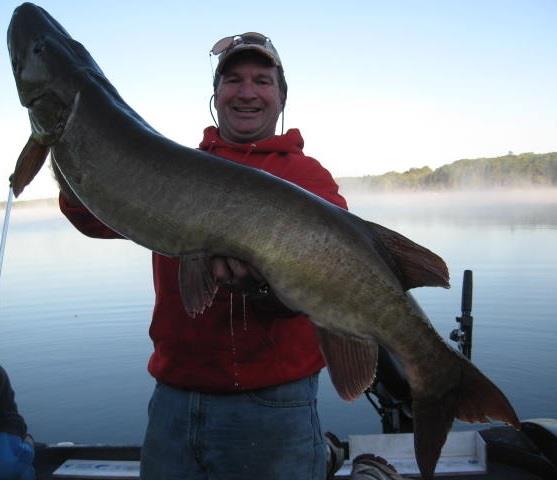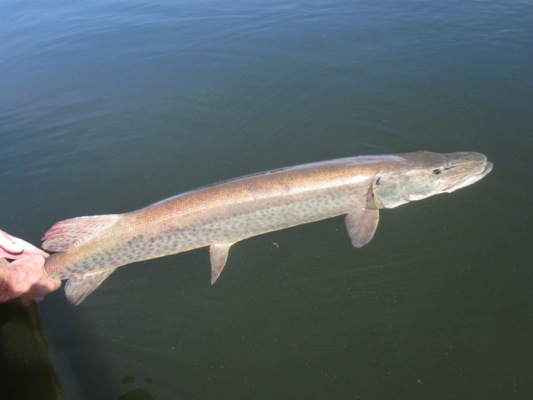|
|
Posts: 92
Location: chicago | Everyone that lives out west know or heard about the rattle snake round ups. These guys that are rounding up the snakes are having a tougher and tougher time each year finding snakes. The round up has only became really popular in the past few years. Guess what, the snakes population hasnt drop off cause the snakes are let go after the weekend, In the spots where they were taken from.Now we all know that snakes also have pea size brains.But now the snakes no not to rattle unless they are really really feel theaten. Even the babies are doing the same thing.This evolution didnt even take 5 years. Two guys just did a whole study on this. The snakes dont rattle , so they dont give up there hiding spots. Now take about fishing pressure, rattle baites, minnow baits, boats, and people!!! Now maybe the fish are also getting wiser even if they have a pea brain. How about the half way follows, or staying 2-3 feet below the bait. THey are smarter then we think and bottom line I think more and more strikes are coming cause they are very angry!!!!! More like this is my area not yours. What do you guys think??? | |
| | |
| "Now maybe the fish are also getting wiser even if they have a pea brain. How about the half way follows, or staying 2-3 feet below the bait. THey are smarter then we think and bottom line I think more and more strikes are coming cause they are very angry!!!!! More like this is my area not yours. What do you guys think???"
We go to a heavily pressured lake around the Chicago area, where you live Stu, and they follow without eating. Must be the pressure. We go to Mille Lacs or Vermillion (where we like to think they fish are pressured) and they dont eat, but just follow. Must be the pressure. People go to an Eagle Lake (notorious for followers) or a LOTWs (getting more and more pressure) and the fish just follow. Must be the pressure.
Ok, take those lakes, they might lead you to believe that the fish don't eat because somehow other anglers are "educating" the fish, and therefore, you cant get them to eat. Right?
Go to a lake with very little pressure. Guess what? They follow much more often than they eat. It's what muskies do. I personally have been on low pressure high density muskie lakes IN CANADA and seen 20-40 follows in a day, that's just what they do.
Better figure 8s increase your chances of fish eating versus following. More and better casts increases your chances of encountering fish that will eat versus following. I personally believe that many of these followers will eat in low light, first light or dark or overnight. In the end though environmental factors that we can't do anything to change such as moon periods, moving barometers, in coming or outgoing weather patterns, amount of light penetration decreases can up your chances of followers becoming eaters. Or maybe just fishing til you find a hungry dumb one will make that fish an eater, versus a follower.
Muskies dont get smarter. Muskies dont get angry. Muskies dont learn. But saying that "other fisherman" are making them "smarter" and thusly YOU dont catch as many fish as you'd like sure does make ya feel better when the water is hard and you cant get out to chase them for a few more months.
Cast or troll in the right place (spot on the spot on the spot) at the right time at the right speed at the right depth til you find a dumb one. Sounds easy, right?
| |
| | |
Posts: 1530
| its funny. on st clair nobodies catching 2 hours later the radios are crackling. the lake explodes. the variables are near endless.. but what do i know. i get humbled often enuff. a pea size brain can fool hundreds of anglers,,, daily | |
| | |
Posts: 92
Location: chicago | You dont muskies learn certain types ofbehavior. There is a place in Wis where they have a musky in a pond and theowner feeds the musky with blue galls. He holds them over the water and the fish comes right up. He drops the fish in the water and the bait is gone. I went over to the pond and stuck out my arm and nothing. I asked to use the bucket and his yellow rain coat stuck my arm out and he still didnt swim over. Could it be that the musky didnt see the blue 5 feet up in the air. But when the owner walks over to the pond the musky swims over. Does he reconize him??? I thought fish only have a 30 second memory. I fish in low pressured waters and still have a hard time. I catch more fish on the chain then up north???? Makes me wonder!!! | |
| | |

Posts: 1460
Location: Kronenwetter, WI | Fish brains have no amydila as far as I am aware. Attributing their behavior to emotions like anger doesn't apply for that reason IMHO. | |
| | |
| stugots4u - 12/15/2007 8:58 PM
You dont muskies learn certain types ofbehavior. There is a place in Wis where they have a musky in a pond and theowner feeds the musky with blue galls. He holds them over the water and the fish comes right up. He drops the fish in the water and the bait is gone. I went over to the pond and stuck out my arm and nothing. I asked to use the bucket and his yellow rain coat stuck my arm out and he still didnt swim over. Could it be that the musky didnt see the blue 5 feet up in the air. But when the owner walks over to the pond the musky swims over. Does he reconize him??? I thought fish only have a 30 second memory. I fish in low pressured waters and still have a hard time. I catch more fish on the chain then up north???? Makes me wonder!!!
You're referencing an event that these fish experience day in and day out on a VERY consistent basis. Every day a positive stimulus is given to the muskie in a VERY controlled setting. The muskies learn to react to that VERY consistent stimulus because it happens every day and is probably their only means of food.
Now translate that to a lake, even a 200 acre lake. There would have to be MANY MANY MANY muskie fisherman throwing the same lure at the same speed EVERY DAY to create that conditioned response in these fish. For a little reading on this: http://en.wikipedia.org/wiki/Classical_conditioning | |
| | |

Posts: 4053
Location: Land of the Musky | I need to make a lure with a mini muskie stun gun on the tail. When it gets close to a muskie, zap! LOL Wouldn't have to worry about barbless hooks either or an easy stun and release  | |
| | |
| wikipedia...the internet's answer to real understanding.
for the love of science, please read source material.
sigh.
fish are fish and have brains just big enough to manage life functions.
a kinda big life function is finding food, so obviously that's something they're pretty capable of doing as a result of positive reinforcement of behavior which succeeds in acquiring them food. they're born with certain behavioral instincts and then experience certain behaviorally shaping events over the course of their life, mostly related to eating since they do that over and over and over and over again in order to survive.
if something like a gazillion boats or lures in the area interferes with successfully getting food, they'll go somewhere else, but it's a biiigggg stretch to say that they get "conditioned" to avoid those areas because they "think" it means people. they just find it easier to eat and live unmolested elsewhere. (ie., they get positively reinforced to go somewhere else rather than negatively punished by being caught once in a blue moon.)
or they just stay right there and do their thing in spite of you and your lures and boats because the food is there and they can eat it there. (or rest there, or procreate there, or whatever the survival need of the moment happens to be.)
| |
| | |
Posts: 1310
Location: Washington, PA | stupid fish. | |
| | |

Posts: 32951
Location: Rhinelander, Wisconsin | tomyv,
You have no idea HOW stupid.
lambeau, Cold Mountain...yup.
One word:
anthropomorphism
| |
| | |
Posts: 92
Location: chicago | Do guys real think these fish cant learn from mistakes??? | |
| | |
Posts: 1636
| Ask the fish  | |
| | |

Posts: 32951
Location: Rhinelander, Wisconsin | 'Learn' in the way you are forwarding is a concept you can't transfer to Muskies.
Short answer is no, they can't, unless the 'mistake' is repeated the same way over, and over, and over....
Here's the problem.
'Learn' in this context is what lambeau was talking about, a form of conditioning that isn't learning in the sense we accept the word. Take a new lure and it's effect, for example. When the lure hits the water the first time, that stimulus is brand new, and the response level from fish exposed to that signature/footprint the highest it should ever be under those exact conditions. The second, third, and one hundred thousandth time, that stimulus elicits a lower level of response, presumably then requiring a higher level of activity to elicit a strike. I think some observers see this and then (anthropomorphism) attribute the reduced response to avoidance.
Look at dogs for a study on conditioning. look at the sheer number of times required for a highly defined stimulus to elicit a trained/learned response. A dog is infinitely more capable of 'learning' than a fish.
If a fish learned to avoid an artificial, and angler, the boat, line, leaders, etc. by 'experience', the number of negative exposures would have to be extensive and by simple exposure in normal circumstance, almost impossible. And, if that DID occur out there (strictly in context of this discussion) CPR would not be a useful technique, because recapture would never happen. Ever.
This is oversimplified, but covers the concepts. There are camps that call for a different view, but so far I don't see those camps gaining any ground in the field of study. That's a good thing, because those camps are mainly in PETA's realm, not the sportsman's. | |
| | |

Posts: 20269
Location: oswego, il | Here is an example of what Steve just said about over and over and over. I had a summer job at silver springs state park when I was a teenager. The main lake was electric motors only. The lake had 4 fish feeders and the boat we used to haul the feed to them had a 9.5 johnson outboard. We could sit at the feeder with the motor running and the fish would come without feed being put into the feeder. Bluegills first, then the bullheads followed by the catfish, in that order every single time. | |
| | |
Posts: 1636
| Same could be said about a fish in a fish tank...even a Muskie.
Its pretty interesting to think about.
But, does that mean TM Tails arent going to work pretty soon because the fish fall for them everytime?
 | |
| | |
Posts: 3163
| has anybody took the time to talk to the Professor who works for berkley and has done tests on fish has far has behavior is concerned and how they will shy away from things and colors after they have had a negative experience,,now 'THAT' would be one intresting on line chat host..We tried to get him to come to our TC chapter meeting but I think Berkley dosent allow him to speak in public anymore | |
| | |

Posts: 8856
| I'd be surprised if SOME conditioning doesn't take place on highly pressured waters. Not in the way people think, i.e they avoid lures because they don't want to get caught, but more that they become so used to seeing lures that they no longer pay attention to them. Certainly a negative experience of being caught might make that particular fish hesitant to eat a lure, but how long is that actually retained?? 15 minutes? Maybe a day? Well into next season? Doubtful, or we'd never catch a fish twice. How many times have you had a fish follow once or twice, fade away, and than catch it later that day?
Can fish be conditioned? Absolutely, just like the fish in your aquarium associate you walking in the room and turning the light on with food. But the ability to retain that conditioning over days or weeks? I'm thinking not.
| |
| | |
| I'd be surprised if SOME conditioning doesn't take place on highly pressured waters. Not in the way people think, i.e they avoid lures because they don't want to get caught, but more that they become so used to seeing lures that they no longer pay attention to them.
absolutely.
but technically it's an attenuation process, not a behavior conditioning process.
research shows that changes occur to the size, shape, and location of brain cells when dealing with familiar vs. unfamiliar environments and environmental stimulii. essentially, animals pay more "attention" to new or unusual stimulus than they do to environmental factors with which they are familiar. familiar things are known to not be a threat/opportunity, so the brain attenuates its attention to them. this makes obvious sense as a survival adaptation - the animal's brain is free to pay more attention to the things that are most likely to matter.
it also lends credence to the "bait they haven't seen before" or "something no one else is throwing" line of thought in order to get noticed. present something unusual and it'll get noticed. of course, this is directly competing with conditioned responses to feed on certain food items which are familiar but yummy.
sooo...if you can imitate a food item in a way the fish haven't seen before? success!
| |
| | |

Posts: 32951
Location: Rhinelander, Wisconsin | Or, for that matter, elicit a strike response with a stimulus that obviously doesn't imitate anything the fish has ever fed on, strengthening the concept that strike response is driven by instinct, thank goodness. It's REALLY difficult to imitate nature well. | |
| |
|
 Rattlesnake roundup
Rattlesnake roundup Rattlesnake roundup
Rattlesnake roundup